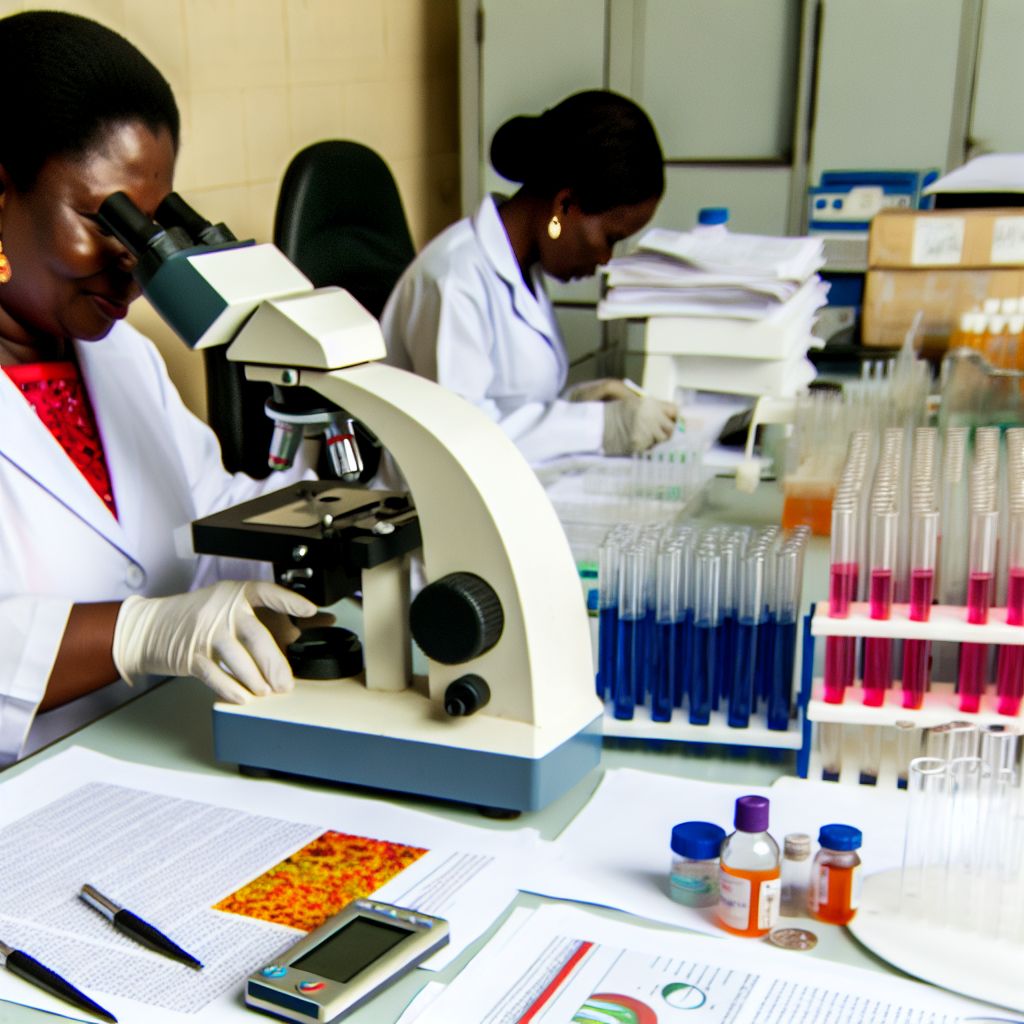Introduction:
Applied microbiology involves the study of microorganisms to understand their role in various applications.
Research centers in Nigeria play a crucial role in advancing microbiological studies through cutting-edge research.
Brief Overview of the Field of Applied Microbiology:
Applied microbiology focuses on utilizing microorganisms for practical applications such as biotechnology, food production, and environmental remediation.
Importance of Research Centers in Advancing Microbiological Studies in Nigeria:
Research centers provide the infrastructure and expertise needed to conduct groundbreaking research in microbiology.
These centers facilitate collaborations, knowledge sharing, and advancements that contribute to the development of the field.
By focusing on research, Nigeria’s microbiology centers help address local challenges and contribute to global scientific progress.
Overview of Existing Microbiology Research Centers in Nigeria
In Nigeria, there are several prominent research centers that specialize in applied microbiology.
These centers play a crucial role in conducting research and developing solutions to microbiology-related challenges in the country.
Mention of Prominent Research Centers Specializing in Applied Microbiology
- National Institute for Pharmaceutical Research and Development (NIPRD)
NIPRD is a leading research center in Nigeria focused on applied microbiology.
They conduct research on the development of pharmaceutical products using microbial processes. - Nigerian Institute of Medical Research (NIMR)
NIMR is renowned for its research in medical microbiology and infectious diseases.
They are at the forefront of studying microbial pathogens and developing interventions to combat them. - Federal Institute of Industrial Research, Oshodi (FIIRO)
FIIRO is another notable research center that specializes in applied microbiology.
They focus on utilizing microbial processes for industrial applications and product development.
Highlight of Their Areas of Focus and Research Activities
- National Institute for Pharmaceutical Research and Development (NIPRD)
NIPRD conducts research on antimicrobial resistance and novel drug discovery.
They work on developing vaccines and antibiotics to address emerging infectious diseases. - Nigerian Institute of Medical Research (NIMR)
NIMR’s research activities include studying the epidemiology of infectious diseases.
They investigate microbial pathogenesis and the mechanisms of drug resistance. - Federal Institute of Industrial Research, Oshodi (FIIRO)
FIIRO’s research focuses on bioethanol production and bioremediation using microbial processes.
They collaborate with industries to develop microbial-based products for commercial use.
Key research projects and achievements
Over the years, Applied Microbiology Research Centers in Nigeria have been at the forefront of conducting groundbreaking research projects that have significantly contributed to the field.
These research centers have made notable achievements and have produced remarkable breakthroughs and discoveries that have had a lasting impact on microbiology research in Nigeria and beyond.
Notable research projects
- The study of antimicrobial resistance patterns in clinical isolates
- Exploration of novel biocontrol agents for agricultural pathogens
- Investigation of the microbiome of indigenous fermented foods
- Characterization of microbial communities in polluted environments
- Development of rapid diagnostic tools for infectious diseases
Breakthroughs and discoveries
- Identification of new antibiotic-resistant genes in clinical strains
- Discovery of bioactive compounds with potential pharmaceutical applications
- Uncovering the role of specific microbes in food fermentation processes
- Insights into the adaptation of microorganisms to polluted habitats
- Validation of novel diagnostic methods for detecting pathogens
These research projects have not only advanced our understanding of microbiology but have also paved the way for the development of innovative solutions to combat antimicrobial resistance, improve agricultural productivity, enhance food safety, and protect the environment.
The contributions of these research centers have been instrumental in addressing key challenges in microbiology and have positioned Nigeria as a hub for cutting-edge research in the field.
Find Out More: The Ongoing Excavations in Nigeria: What to Expect
Collaboration with International Research Institutions
Nigeria has been actively engaging in partnerships and collaborations with various foreign research institutions.
These collaborations have allowed Nigerian microbiologists to tap into the expertise and resources of international experts.
By working with foreign institutions, Nigerian researchers have gained access to cutting-edge technologies and methodologies.
The exchange of ideas and knowledge through these collaborations has greatly enriched the research capabilities of Nigerian microbiologists.
Discuss Partnerships and Collaborations with Foreign Research Institutions
Nigerian research centers have established partnerships with renowned institutions like the CDC in the United States.
Collaborations with institutions in the UK, Germany, and other countries have also been instrumental in advancing microbiological research in Nigeria.
These partnerships involve joint research projects, training programs, and the exchange of researchers between the collaborating institutions.
Nigerian microbiologists often collaborate with their counterparts in foreign institutions to address global health challenges and infectious diseases.
Explore How These Collaborations Have Enriched the Research Capabilities of Nigerian Microbiologists
Through collaborations with international research institutions, Nigerian microbiologists have been able to publish high-impact research papers.
These collaborations have provided Nigerian researchers with opportunities for professional development and networking with experts in the field.
The exchange of best practices and methodologies has helped Nigerian microbiologists to enhance their research skills and techniques.
Collaborations with international institutions have also led to increased funding opportunities for microbiological research projects in Nigeria.
Gain More Insights: Applied Mathematics Student Associations in Nigeria
FUNDING AND SUPPORT FOR MICROBIOLOGY RESEARCH CENTERS
There are various sources of funding available for microbiology research centers in Nigeria.
Government agencies play a significant role in providing funding for research centers.
Private sectors and non-profit organizations also contribute to funding microbiology research centers.
International collaborations and partnerships provide additional funding opportunities for research centers.
Grants and research funding from international organizations support the research activities of these centers.
Research centers also generate revenue through collaborations with industries and consulting services.
Donations and endowments from philanthropic individuals and organizations contribute to funding research centers.
Microbiology research centers often receive funding from universities and academic institutions.
Fundraising events and crowdfunding campaigns are conducted to raise funds for research activities.
EXAMINE THE SOURCES OF FUNDING FOR THESE RESEARCH CENTERS
Government funding is one of the primary sources of financial support for microbiology research centers.
Research grants from government agencies such as the National Institutes of Health (NIH) and the Nigerian Institute for Medical Research (NIMR) support research activities.
State and local governments also allocate funds for microbiology research centers within their jurisdiction.
International funding agencies such as the World Health Organization (WHO) and United Nations Development Programme (UNDP) provide grants for research projects.
Private sector companies in the pharmaceutical and biotechnology industry sponsor research projects in microbiology.
Transform Your Career with Expert Guidance
Get personalized mentorship consulting that’s tailored to your unique path. Our expert advice is actionable and exclusive.
Get StartedNon-profit organizations focused on health and research also provide funding for microbiology research centers.
Universities and academic institutions allocate funds for research centers affiliated with their institutions.
Donors and benefactors contribute financially to microbiology research centers to support innovative research projects.
Crowdfunding platforms and online fundraising campaigns help raise funds for specific research initiatives.
DISCUSS THE ROLE OF GOVERNMENT AGENCIES AND OTHER STAKEHOLDERS IN SUPPORTING MICROBIOLOGY RESEARCH IN NIGERIA
Government agencies such as the Federal Ministry of Health and the Nigerian Institute of Medical Research play a crucial role in supporting microbiology research.
These agencies provide research grants, infrastructure support, and technical expertise to research centers.
Government policies and programs promote collaboration between research centers and other stakeholders in the healthcare industry.
Regulatory bodies ensure that research activities conducted by microbiology research centers adhere to ethical standards.
Non-governmental organizations (NGOs) and community-based organizations support research projects that address public health challenges.
Academic institutions collaborate with microbiology research centers to train the next generation of researchers.
Industry partners contribute funding and resources for research projects that have commercial applications.
International organizations provide technical assistance and capacity building support to enhance research capabilities.
Collaboration between government agencies, stakeholders, and research centers is essential for advancing microbiology research in Nigeria.
Explore Further: Agricultural Science Project Ideas for Nigerian Students

Common Challenges Faced by Microbiology Research Centers
Microbiology research centers in Nigeria face several challenges that hinder their effectiveness and productivity.
Some of the common challenges include:
- Limited Funding: One of the major challenges faced by microbiology research centers in Nigeria is inadequate funding. This limits their ability to purchase necessary equipment, conduct research, and attract top talent.
- Infrastructure Constraints: Many research centers in Nigeria lack proper infrastructure such as laboratories, research facilities, and equipment. This hampers their ability to carry out advanced research and experiments.
- Brain Drain: Another significant challenge is brain drain, where talented researchers and scientists leave the country in search of better opportunities abroad. This results in a loss of skilled manpower and expertise within the research centers.
- Lack of Government Support: Microbiology research centers often struggle due to the lack of adequate support from the government. Inconsistent policies and poorly implemented initiatives make it difficult for these centers to thrive.
- Insufficient Collaboration: Limited collaboration between research centers, universities, and industry in Nigeria hinders the sharing of knowledge, resources, and expertise. This lack of synergy limits the impact and outcomes of microbiology research.
- Inadequate Research Funding: While funding is a major challenge, the allocation of funds to research projects within microbiology research centers is often insufficient. This restricts the scope and quality of research being conducted.
Addressing the Challenges
To overcome these challenges and enhance the effectiveness of microbiology research centers in Nigeria, several steps can be taken:
- Increased Government Funding: The government should allocate more funds to support research centers, improve infrastructure, and attract top researchers.
- Enhanced Collaboration: Encouraging collaboration between research centers, universities, and industry players can foster innovation, knowledge sharing, and resource pooling.
- Capacity Building: Investing in training programs, workshops, and initiatives to build the capacity of researchers and scientists can help retain talent within the country.
- Promoting Research Grants: Providing grants and funding opportunities for research projects within microbiology can incentivize researchers and enhance the quality of research being conducted.
- Strengthening Policies: Implementing stable and supportive policies that promote research and innovation can create a conducive environment for research centers to thrive.
- Public-Private Partnerships: Establishing partnerships between research centers and private sector entities can bring in additional funding, resources, and expertise to support research activities.
By addressing these challenges and implementing strategic initiatives, microbiology research centers in Nigeria can overcome obstacles, enhance productivity, and contribute significantly to the advancement of microbiology research in the country.
See Related Content: Applied Zoology Fieldwork: What to Expect in Nigeria
Future Prospects and Recommendations
As Nigeria continues to develop and grow, there are numerous opportunities for expanding and strengthening microbiology research in the country.
With the right investments and strategies, the impact of microbiology research centers can be enhanced significantly.
Here are some recommendations for policymakers, researchers, and stakeholders:
Explore Opportunities for Expanding and Strengthening Microbiology Research in Nigeria
- Invest in state-of-the-art equipment and facilities to support cutting-edge research.
- Encourage collaboration between research institutions, government agencies, and private sector companies.
- Provide funding and grants for microbiology research projects to attract top talent and drive innovation.
- Develop specialized training programs to build a skilled workforce in the field of microbiology.
- Establish partnerships with international research centers to leverage global expertise and resources.
- Support initiatives that focus on addressing public health challenges and promoting sustainable development through microbiology research.
Provide Recommendations for Policymakers, Researchers, and Stakeholders
- Implement policies that prioritize research and development in microbiology to drive scientific advancements.
- Create incentives for researchers and institutions to conduct high-impact research with practical applications.
- Support regulatory frameworks that facilitate the commercialization of innovative microbiology products and technologies.
- Encourage the dissemination of research findings through publications, conferences, and outreach programs.
- Foster a culture of collaboration, knowledge sharing, and mentorship within the microbiology research community.
- Engage with policymakers to advocate for increased funding and support for microbiology research centers.
By implementing these recommendations and taking proactive steps to enhance microbiology research in Nigeria, the country can position itself as a leader in scientific discovery and technological innovation.
With a strong foundation and a commitment to excellence, microbiology research centers can contribute significantly to addressing global challenges and improving the quality of life for all Nigerians.
Importance of Applied Microbiology Research in Nigeria
Applied microbiology research centers play a crucial role in advancing scientific knowledge in Nigeria.
These centers serve as hubs for innovation, fostering collaborations between researchers and industry partners.
They contribute to the development of new technologies, treatments, and products that benefit society.
The role of these research centers drives progress and economic growth in the region.
Investing in applied microbiology research centers can position Nigeria as a leader in scientific advancements.
These centers are essential for the advancement of science, technology, and innovation in Nigeria.
Additional Resources
List of Journal Abbreviations This list is based mostly on ISO 4:1997 …
The Nigerian Institute Of Medical Research – Research For National …




